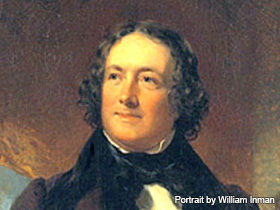Andalusia; Bank War; History of the Expedition of Captains Lewis and Clark; Port Folio; Princeton University; Second Bank of the United States; University of Pennsylvania
Nicholas Biddle was born in Philadelphia in 1786. Entering school at the young age of ten, Biddle graduated from Princeton in 1801. He soon moved to Europe where he served future President James Monroe. Biddle returned to Philadelphia in 1807 where he continued his education. Monroe selected Biddle to be government director of the Second Bank of the United States. The current president retired and Biddle became president leading the bank to unprecedented success. In the "Bank War," Andrew Jackson opposed the bank until it closed its doors. After 14 years, Biddle retired and died in 1844 in Philadelphia.
Nicholas Biddle was born on January 8, 1786, in Philadelphia. As a child he grew up with his father Charles Biddle, a merchant and vice president of Supreme Executive Council of Pennsylvania, and mother Hannah Shepard. Biddle entered University school at the early age of ten. He started in the University of Pennsylvania and then moved on to the College of New Jersey at Princeton. He graduated Princeton in 1801 at the age of 15. Nicholas Biddle then moved to Europe in 1804. There he traveled to several countries including England where he served as a temporary secretary to American Ambassador James Monroe. He stayed in London, England, serving Monroe until 1807 when Biddle returned to Philadelphia.
Now in Philadelphia, Nicholas Biddle started to write and make contributions to the Port Folio, an important Philadelphia literary magazine. Biddle also continued his education in law; he was later admitted to the bar in 1809. That same year Biddle also was elected into the lower house of Pennsylvania legislature as an American Republican. During this time, Biddle married Jane Craig and fathered five children. In 1812, Biddle became temporary editor to the Port Folio. He also began History of the Expedition of Captains Lewis and Clark; however, he is not credited for the parts of the report that he worked on. Shortly after this episode, Biddle put aside his literary work and was elected into a four-year term in the state senate in 1814. Jane Craig urged Biddle to run for Congress with appointment from Biddle's friend President Monroe whom he served in London, England. Biddle ran two times as a Republican but failed to get elected. After Biddle lost, Monroe offered Biddle two jobs: the first was to compile a volume on laws and regulations of foreign countries; the second, and far the more important job, was to act as the government director of the Second Bank of the United States.
In this position, Biddle held views opposed to the current president of the bank, Langdon Cheves, yet Biddle still supported Cheves and voted for his reelection. Biddle retired from the board in 1821. Upon retiring, Biddle returned to his home at his wife's family estate, Andalusia. There he served on several committees such as Wistar Associatio
n, the American Philosophical Society, the Philadelphia Academy of Fine Arts, the Society for Promoting Agriculture, the Historical Society of Pennsylvania, and the American Philosophical Society. In 1822, Langdon Cheves resigned from the bank and Biddle was elected to the board at the age of 36. Biddle selected his friend Thomas Cadwalader as his second in command. The two of them led the bank to high growth and development. They developed the bank such that it was more popular then ever and able to guarantee stable currency system. After this period of success, the "Bank War" began. President Andrew Jackson led the opposition of the Second Bank of the United States. Jackson felt that the bank held too much power in turn giving Biddle that power. Jackson also wanted a banking system where all money was backed by gold. Though Biddle had much support from powerful politicians Henry Clay and Daniel Webster, the bank was not able to renew its 20-year charter due to Jackson's veto. The bank had to close soon after in 1841.
After serving the bank for 14 years, Biddle retired once again to Andalusia. Biddle lived here until he died on February 27, 1844, from clinical depression and bronchitis.
- "Bank War." Encyclopedia Britannica. 2007. Britannica Concise Encyclopedia. 20 Apr. 2007. <>http://concise.britannica.com/ebc/article-9356536/Bank-War>.
- Govan, Thomas. Nicholas Biddle: Nationalist and Public Banker. Chicago: U of Chicago P, 1959.
- McGrane, Reginald C. The Correspondence of Nicholas Biddle. Boston: J. S. Canner and Company, 1966.
- "Nicholas Biddle." Encyclopedia Britannica. 2007. Britannica Concise Encyclopedia. 20 Feb 2007. <>http://concise.britannica.com/ebc/article-9357228/Nicholas-Biddle>.
- Shade, William G. "Biddle, Nicholas." American National Biography Online. 2000. 26 Sept. 2011. <>http://www.anb.org.ezaccess.libraries.psu.edu/articles/03/03-00039.html?....
- Taylor, George. Jackson vs. Biddle's Bank. 2nd ed. Lexington, MA: D.C. Heath and Company, 1972.
- Wright, Robert E., and David J. Cowen. Financial Founding Fathers: The Men Who Made America Rich. Chicago: U of Chicago P, 2006.
Politician and banker Nicholas Biddle is famous for having lost the fight over the Second Bank of the United States with Andrew Jackson.

